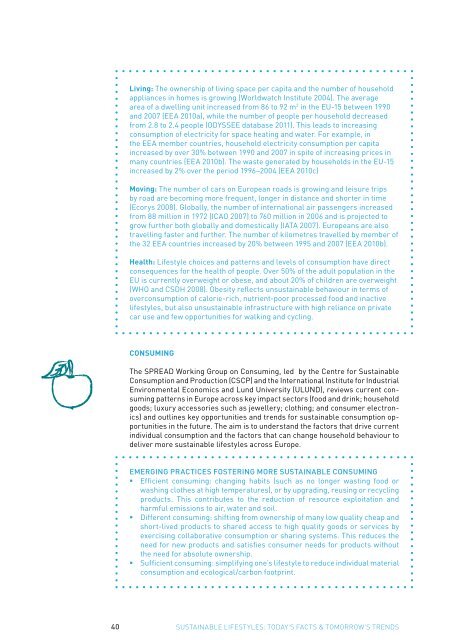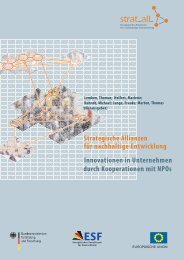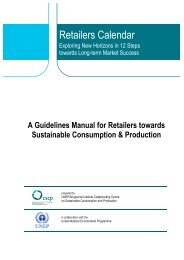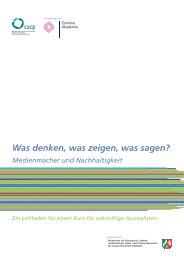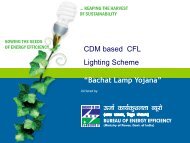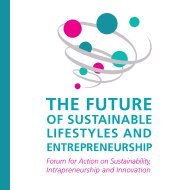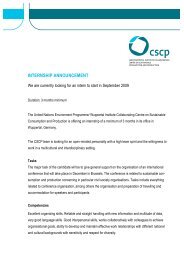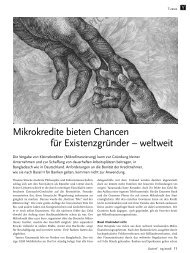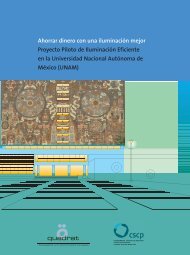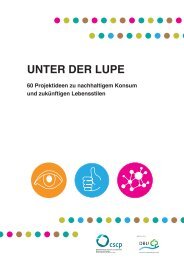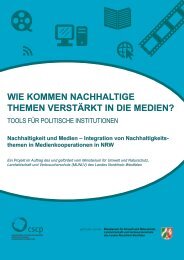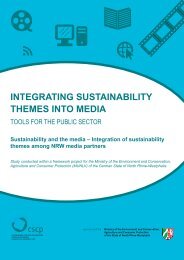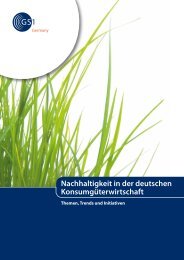today's facts & tomorrow's trends - SPREAD Sustainable Lifestyles ...
today's facts & tomorrow's trends - SPREAD Sustainable Lifestyles ...
today's facts & tomorrow's trends - SPREAD Sustainable Lifestyles ...
You also want an ePaper? Increase the reach of your titles
YUMPU automatically turns print PDFs into web optimized ePapers that Google loves.
Living: The ownership of living space per capita and the number of household<br />
appliances in homes is growing (Worldwatch Institute 2004). The average<br />
area of a dwelling unit increased from 86 to 92 m 2 in the EU‐15 between 1990<br />
and 2007 (EEA 2010a), while the number of people per household decreased<br />
from 2.8 to 2.4 people (ODYSSEE database 2011). This leads to increasing<br />
consumption of electricity for space heating and water. For example, in<br />
the EEA member countries, household electricity consumption per capita<br />
increased by over 30% between 1990 and 2007 in spite of increasing prices in<br />
many countries (EEA 2010b). The waste generated by households in the EU-15<br />
increased by 2% over the period 1996–2004 (EEA 2010c)<br />
Moving: The number of cars on European roads is growing and leisure trips<br />
by road are becoming more frequent, longer in distance and shorter in time<br />
(Ecorys 2008). Globally, the number of international air passengers increased<br />
from 88 million in 1972 (ICAO 2007) to 760 million in 2006 and is projected to<br />
grow further both globally and domestically (IATA 2007). Europeans are also<br />
travelling faster and further. The number of kilometres travelled by member of<br />
the 32 EEA countries increased by 20% between 1995 and 2007 (EEA 2010b).<br />
Health: Lifestyle choices and patterns and levels of consumption have direct<br />
consequences for the health of people. Over 50% of the adult population in the<br />
EU is currently overweight or obese, and about 20% of children are overweight<br />
(WHO and CSDH 2008). Obesity reflects unsustainable behaviour in terms of<br />
overconsumption of calorie-rich, nutrient-poor processed food and inactive<br />
lifestyles, but also unsustainable infrastructure with high reliance on private<br />
car use and few opportunities for walking and cycling.<br />
Consuming<br />
The <strong>SPREAD</strong> Working Group on Consuming, led by the Centre for <strong>Sustainable</strong><br />
Consumption and Production (CSCP) and the International Institute for Industrial<br />
Environmental Economics and Lund University (ULUND), reviews current consuming<br />
patterns in Europe across key impact sectors (food and drink; household<br />
goods; luxury accessories such as jewellery; clothing; and consumer electronics)<br />
and outlines key opportunities and <strong>trends</strong> for sustainable consumption opportunities<br />
in the future. The aim is to understand the factors that drive current<br />
individual consumption and the factors that can change household behaviour to<br />
deliver more sustainable lifestyles across Europe.<br />
Emerging practices fostering more sustainable consuming<br />
• Efficient consuming: changing habits (such as no longer wasting food or<br />
washing clothes at high temperatures), or by upgrading, reusing or recycling<br />
products. This contributes to the reduction of resource exploitation and<br />
harmful emissions to air, water and soil.<br />
• Different consuming: shifting from ownership of many low quality cheap and<br />
short-lived products to shared access to high quality goods or services by<br />
exercising collaborative consumption or sharing systems. This reduces the<br />
need for new products and satisfies consumer needs for products without<br />
the need for absolute ownership.<br />
• Sufficient consuming: simplifying one’s lifestyle to reduce individual material<br />
consumption and ecological/carbon footprint.<br />
40<br />
SUSTAINABLE LIFESTYLES: TODAY’S FACTS & TOMORROW’S TRENDS


